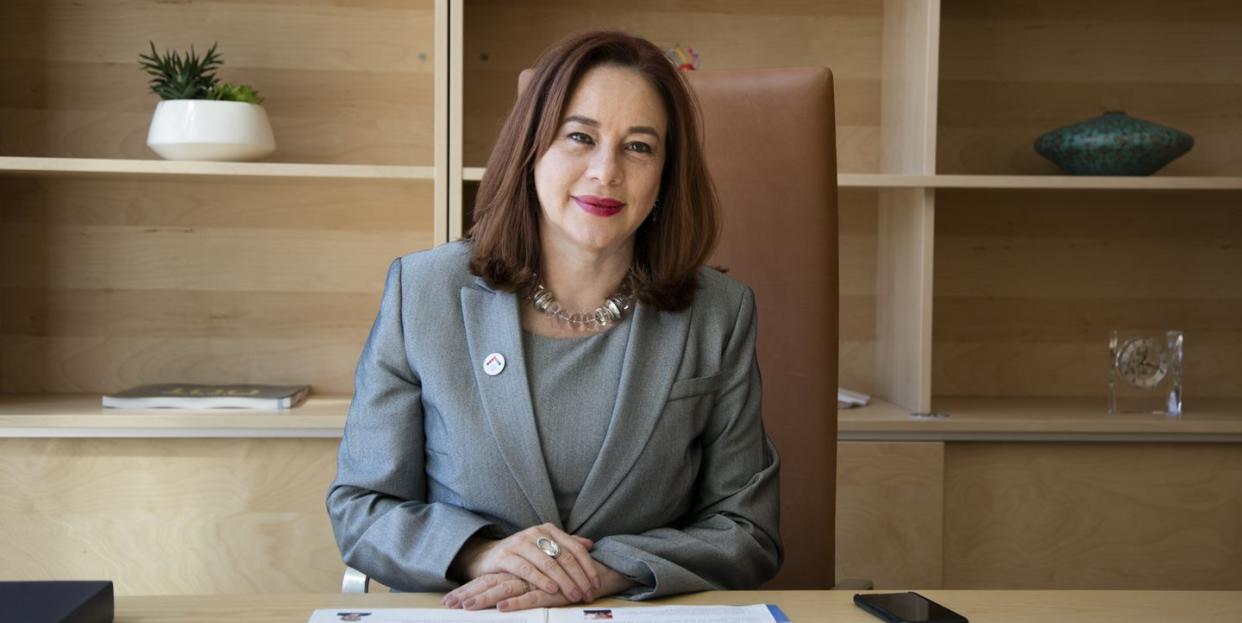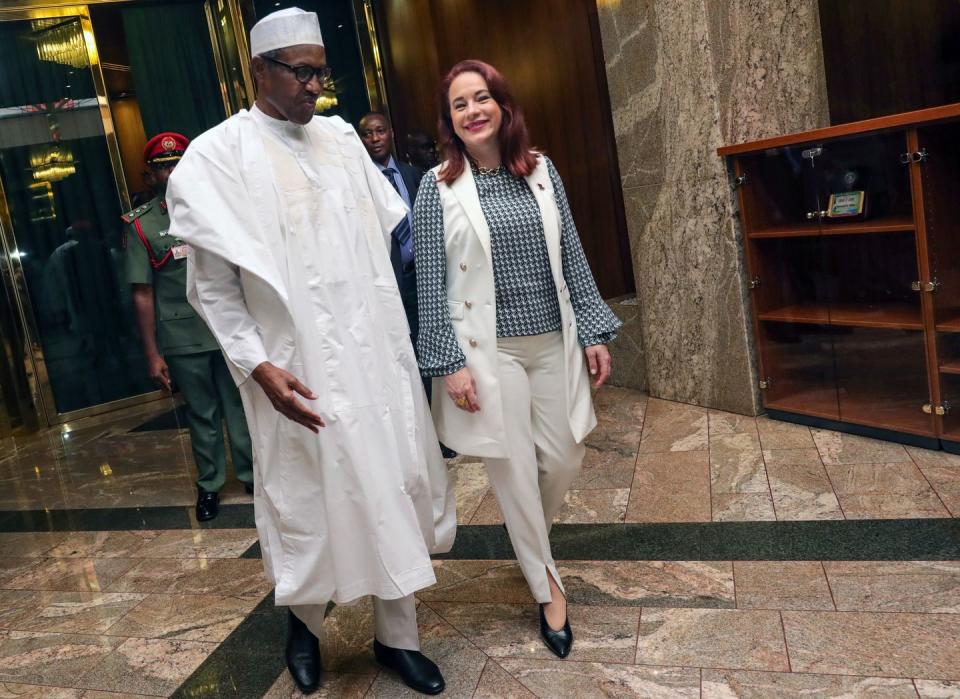Meet the First Latina to Become President of the U.N. General Assembly

On OprahMag.com, we celebrate Latinidad and all identities every day. But for Hispanic Heritage Month September 15 through October 15, we're highlighting stories from Latinx perspectives, which you can read here. Disfruten!
If you’ve ever wondered what it’d feel like to be a minor character in a spy thriller, I recommend paying the President of the United Nations General Assembly a visit. Upon stepping out of a cab in front of the U.N.’s imposing, flag-festooned New York headquarters, an aide whisks visitors through a series of security checkpoints that begin with a TSA-comparable screening before rapidly escalating to flashing a cool temporary badge at various uniformed guards as yet another door opens. On a late summer day in 2019, this is how I met María Fernanda Espinosa, the 73rd President of the U.N. General Assembly.
“I have to say it proudly: I am the first female Latin-American President in U.N. history,” Espinosa tells OprahMag.com. The seasoned diplomat and politician is also the fourth woman ever elected to the highest position in the organization, garnering 128 votes from 193 member states in 2018. We met in her excellency’s office for our chat, where earth-toned mid-century modern furniture compliments wood-paneled walls—and the windows offer a soothing, almost cruise ship-like view of the East River. Two tributes to Espinosa’s home country of Ecuador sit on the glass coffee table—a brilliant blue rose, and a bowl full of Pacari mini chocolate bars with flavors like “Cuzco pink salt and nibs.” (She encouraged me to take two.) Like Espinosa herself, the room somehow felt both warm and commanding.
As President of the U.N. General Assembly from September 2018 to September 2019, Espinosa's work took her around the globe, from closed-door meetings with heads of state to Jordan's Zaatari camp for Syrian refugees. She's quick to point out that the organization is more than just a "talk shop"; the United Nations feeds 90 million people a year and assists on the ground following natural disasters, in addition to setting high level policy that impacts the entire world.
"No country alone can address these issues, because they are trans-boundary issues by nature," Espinosa explains. "My role as president is making sure we agree on the fundamentals."
Prior to her year in office, Espinosa's resume has been nothing short of jaw-dropping: She served as Ecuador’s Minister of National Defense, and as Coordinating Minister of Natural and Cultural Heritage. She has also been Ecuador's Minister of Foreign Affairs twice. It wasn't a burning need to work in politics that's driven her career path, however. It all started when she pursued two of her passions: Language and geography. And about the former...did we mention Espinosa is also a published poet?

"I read poetry every day, no matter how late I go to bed, or how busy I am," says Espinosa, who earned her first degree in linguistics. "It’s like when you say you have to brush your teeth, or you have to drink water. I read poetry as part of my existential need." She counts Maya Angelou and Garcia Lorca among those who've written her favorite poems, and while she has precious little time to write these days, Espinosa calls the art form "the bread and butter of my existence."
"And the truth is, in diplomacy, the weight and the power of words—of narratives—is so important," she continues. "That’s where poetry helps."
After college, Espinosa's other passion led her to the Amazon. “I have a master’s degree in Amazonian studies,” she explains. “The Amazon itself is shared by eight countries, so when looking at the Amazon, you immediately have to look beyond the national borders.” Espinosa’s early jobs in academia introduced her to the political arena, as she worked to help protect all forms of life in the region. “At the time in the ‘90s, the Amazon was a big thing, and biodiversity conservation and indigenous peoples’ rights were an international issue.”
Becoming Minister of National Defense years later tapped Espinosa's knack for sussing out how complex interconnected systems operate—so that she could work within them to effect major change. "To know that you are in charge of the armed forces of your country, the defense policy, the security issues of the country, and the protection of your national borders, it's a big challenge," she says, adding that her new, predominately-male colleagues weren't used to having a woman as minister. Further, "critical public opinion was saying, 'a female? A geographer? A poet?'"

She adds: "It's about understanding the culture very quickly, and also learning to work together with the military. They’re professional, well organized, very efficient in the way they deliver, and they need strong leadership. I was able to do that." Espinosa cites a ministerial directive to prevent and combat violence and harassment against women in the armed forces, as well as the military's first gender equality policy, as some of the most satisfying projects she helped bring about.
In her time as President of the U.N. General Assembly, Espinosa says two things surprised her. First, when it came to equality at the United Nations, there was still work to be done there, too. "You have to twist arms here to make sure that all our panels have gender parity, that the negotiations are equally co-chaired with female ambassadors and male ambassadors." The second need she hadn't anticipated? Eradicating the in-house plastic bottle problem.
"I said no, no no, this cannot be! And I put all of my energy with the support of the U.N. Secretary General," Espinosa explains. "Finally, after several months of work, we are a single-use plastic-free venue." The U.N. also launched a global campaign against plastic pollution, and passed important legislation intended to curb toxic trash dumping.

In both August and in September—her last month as President—Espinosa welcomed another ardent environmentalist to the United Nations: Greta Thunberg, the 16-year-old Swedish activist whose speech at the 2019 United Nations Climate Action Summit has gone viral. It's hard not to think of Thunberg as Espinosa shares advice for young women who'd like to be President of the U.N. General Assembly themselves one day. "You have to have a passion for fixing the world. Be a dreamer. Be audacious."
For more stories like this, sign up for our newsletter.

